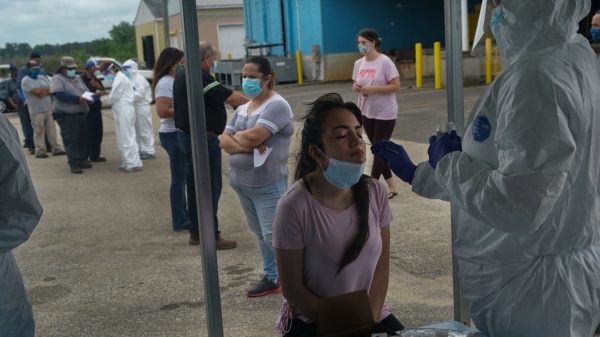How You Get Your Berries: Migrant Workers Who Fear Virus, but Toil On

Shawdesh Desk:
Workers at the largest blueberry farm in the Northeast move through the fields in small groups, fingers dancing with the speed of musicians as they pick bushes heavy with fruit.
The more they gather, the more they are paid during a season that lasts only about seven weeks.
Barring rain, they work seven days a week; there is no time for illness.
But everywhere there are reminders of the coronavirus and its power to sweep quickly through tightly packed farm camps.
It is the reason laborers who live and toil close together wear bandannas across their faces in the hot sun and work separated by plexiglass in the fruit packaging facility.
It is what had them standing in line on a steamy morning, weeks before picking started, to be tested for the virus at the large farm in southern New Jersey, Atlantic Blueberry Company in Hammonton.
“It feels a little uncomfortable,” said Angel Rodriguez, who works in the farm’s packaging facility. “You don’t know if somebody is contagious.”
Mr. Rodriguez, 34, left Puerto Rico in March to begin working his way up the East Coast, stopping for two months in Florida before arriving in late May in Atlantic County, the hub of New Jersey’s thriving blueberry industry.
He is one of an estimated 22,000 seasonal workers who tend and harvest crops in New Jersey, nicknamed the Garden State for its robust agriculture industry.
Like Mr. Rodriguez, many laborers follow the ripening crops up the Eastern Seaboard, starting in Florida, where migrant living quarters have been ravaged by the virus, and working their way north to Maine.
Making life even more perilous this year, they have been deemed essential workers — exempt from stay-at-home orders and a 14-day quarantine rule in New Jersey for people coming from states where the virus is spreading quickly. With each influx of new workers comes the risk of a fresh outbreak. In New Jersey, 3,900 farmworkers had been tested as of Thursday and 193 were positive for the virus, according to the state’s Department of Health. Of these, 14 migrant workers who had nowhere to remain isolated were placed in quarantine at a state-run field hospital at the Atlantic City Convention Center.
“It’s a little dangerous,” said Felix Nieves, 56, who works as a supervisor at Atlantic Blueberry. The 1,300-acre farm is considered the biggest blueberry producer in the Northeast.
“But farming never stops. The fruit will not wait for this to pass.”
The first round of testing at Atlantic Blueberry was done early in the season, before most workers had arrived. Three of the first 56 people tested were positive for the virus.
The health risks posed by the virus have made testing a priority at the sprawling farm, according to an owner, Paul Galletta.
“As often as they can come, we will test,” Mr. Galletta said of the health workers who wore white jumpsuits, masks, face shields and gloves as they gathered nasal swabs. They have returned three times.
A sick work force during a short growing season could be financially catastrophic.
“This crop comes in, virus or no virus,” said Denny Doyle, president of the New Jersey Blueberry Industry Advisory Council.
Atlantic Blueberry purchased 3,000 bandannas and gave each worker two — one to wear, one to wash — and hung fire-retardant cloth between beds in the dormitories where hundreds of laborers live during the season. Mr. Doyle said the farm also purchased several additional buses to create extra space on the shuttles that run to and from the fields.
Agriculture is New Jersey’s third-largest industry. The state is among the nation’s top producers of blueberries, cranberries, peaches and eggplant.
In May, state health officials arranged for four federally qualified health centers to begin testing and issued safety guidelines that offered a range of ambitious — some say impractical — suggestions for farm owners. Farmers were told to avoid bunked beds, require masks and create separate housing for anyone who tested positive for the virus, among other recommendations.
There are no penalties for noncompliance.
New Jersey’s 5 percent rate of infection among farmworkers may actually be higher. Day laborers who do not live on the farms are unlikely to be among those tested by the health centers. Workers who are tested in private medical practices are not included in the tally.
The testing program is also voluntary, and 57 farms have barred medical teams from doing on-site testing, according to Dr. Lori Talbot, who treats migrant farm workers and viewed the list of noncompliant farms that was sent to the state’s health and labor departments.





























Leave a Reply